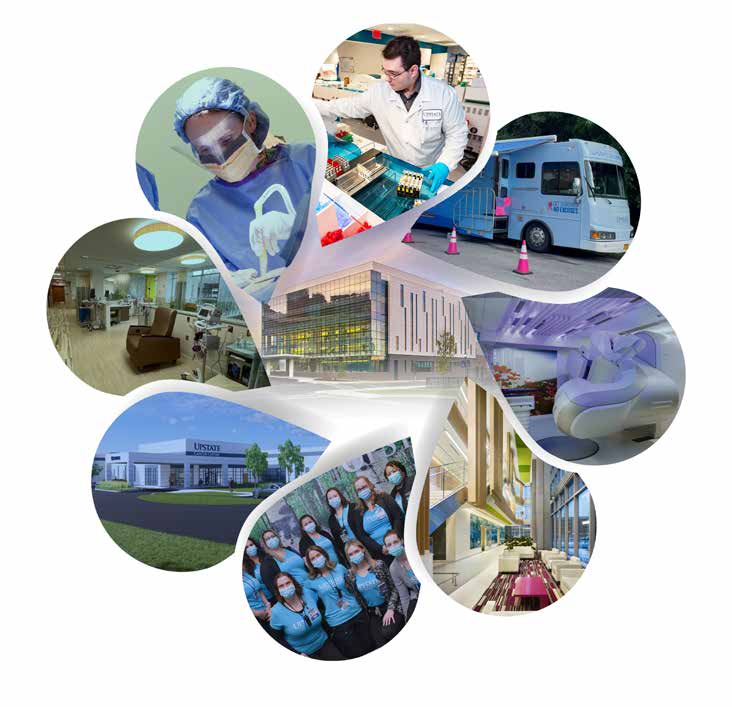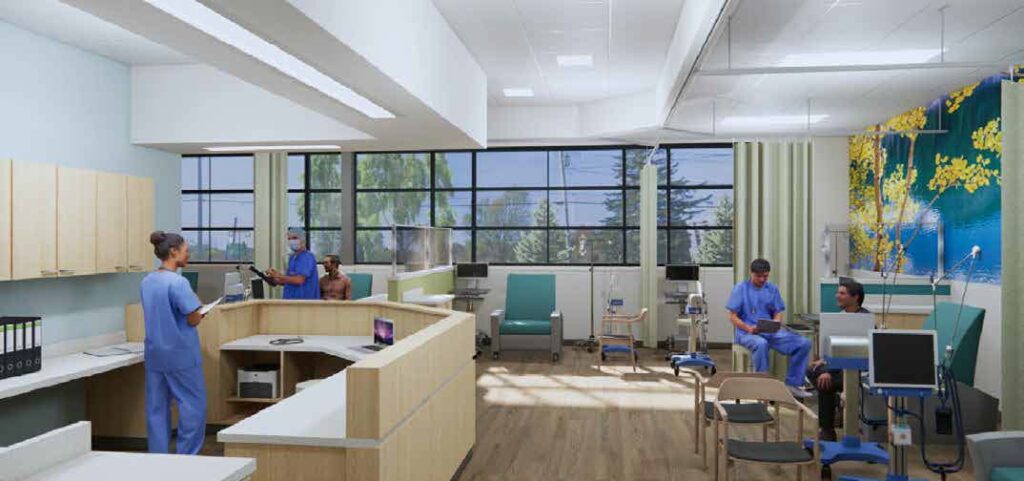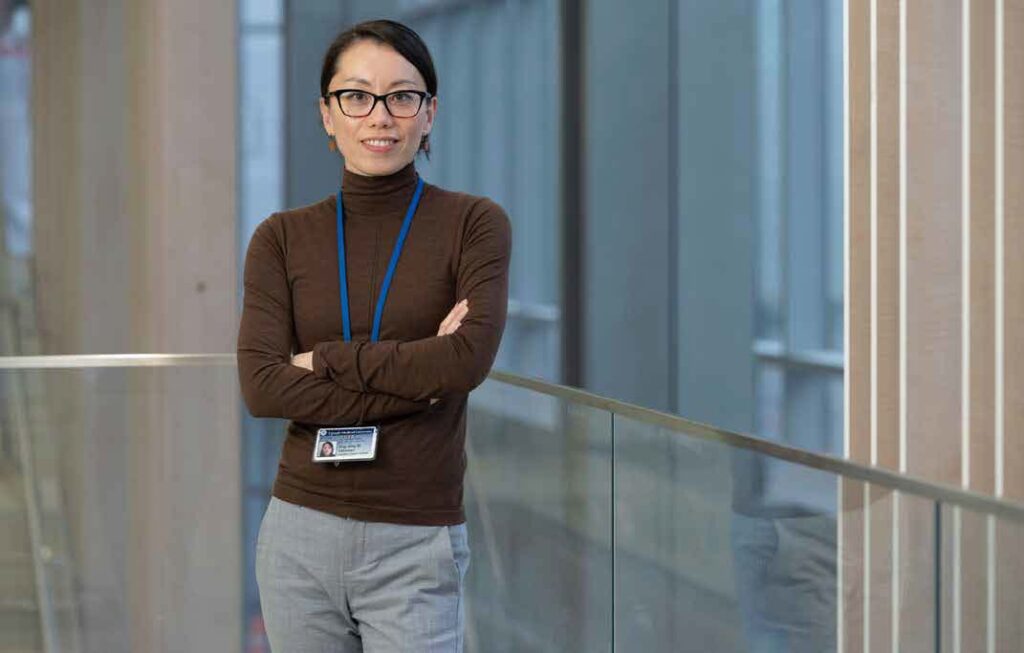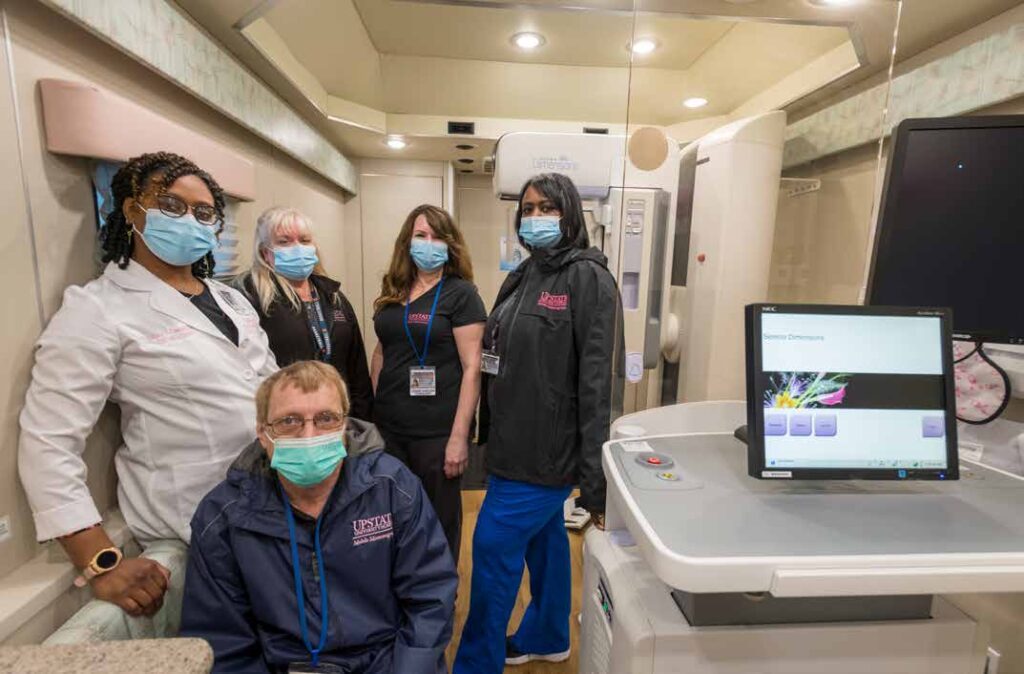BY BECCA TAURISANO

On our cover: The Upstate Cancer Center has been continuously accredited by the ACS Commission on Cancer since 2006 and is supported by services to meet its mission. Clockwise from top: the Clinical Pathology Lab on the fifth floor of the Cancer Center provides advanced testing and diagnostics. • Upstate’s mammovan covers 10 CNY counties. • TrueBeam technology provides precision radiotherapy at nearly any angle. • Interiors of the Cancer Center reflect the theme of healing supported by nature. • A dedicated nursing team at the Cancer Center location at Community Hospital. • The newest Cancer Center site in is opening in Verona, NY, this summer. • The infusion area at the Cancer Center at Community site on Onondaga Hill. • Surgeons provide leading-edge treatments and participate in the Cancer Center’s many tumor boards.
THE UPSTATE CANCER CENTER has a role that extends far beyond providing state-of-the-art care. Its mission to improve outcomes in the community is further supported by delivering preventative education and services, conducting biomedical research and clinical trials, and improving access for underserved populations. By expanding locations and support services, along with investing in cancer-fighting technology, the Upstate Cancer Center offers interdisciplinary treatments that are on par with national cancer centers and aligned with the Cancer Moonshot goal to cut the death rate from cancer by 50% over the next 25 years.
Multidisciplinary Approach to Care
With a team of more than 90 board-certified physicians, the Upstate Cancer Center organizes cancer care into tumor-specific programs. While all types of cancer are treated, there are multidisciplinary programs for bladder; breast; gynecology oncology; head and neck; kidney; liver, gallbladder, and pancreas; melanoma; neuro oncology; prostate; thyroid and thoracic oncology. Tumor boards for the programs are comprised of surgeons, medical oncologists, radiation oncologists, radiologists, pathologists and other specialists, as well as a dedicated research associate to identify and recruit patients for clinical trials. “Patients who require decision-making that spans these disciplines are discussed at our tumor boards,” says Interim Director Thomas J. VanderMeer, MD, FACS. “The multidisciplinary team determines the best course of care involving multiple modalities.” The high degree of specialization and frequency of the tumor boards at Upstate Cancer Center is not found elsewhere in Central New York.
Clinical Innovation
The Upstate Cancer Center has numerous innovations in medical oncology, radiation oncology and surgery. Gennady Bratslavsky, MD, Deputy Director of the Upstate Cancer Center and chair of Urology, says the robotic surgery program has initiated novel surgeries not done elsewhere in the world, such as the first-ever robotic replacement of the vena cava and a level III inferior vena cava thrombectomy first performed here 10 years ago. Such technical advances on the surgical side allow patients to receive modern care as well as faster recovery and return to home.






“Our clinical pathways are very strong,” says Dr. Bratslavsky. “The expertise of our surgeons is unparalleled for the area.”
For radiation oncology, physicians offer numerous approaches in improved targeting, which minimizes potential damage to nearby healthy tissue and offers improved and shorter treatment regimens. “The radiation team offers treatment
with such precision the approach is on par with that of our surgical team,” says Dr. Bratslavsky. Radiation Oncology also works with several departments to provide opportunities for theranostics: a novel approach combining therapy with diagnostics. The radiation is delivered intravenously, only released at the molecular level where the tumor cells are located. “Theranostics is only just now becoming a concept in medical therapy, and yet at Upstate, our first patient was treated well over two years ago with this approach,” says Dr. Bratslavsky.
On the medical oncology side, the Upstate Cancer Center has committed to innovations in both preventative care and combination cancer therapy, currently serving as a site for cancer vaccine clinical trials. Oral chemotherapy is prevalent as well, allowing patients to take chemotherapy at home under the guidance of the Upstate Cancer Center.
Expanded Locations and Telemedicine Options
In order to make cancer care more convenient for patients, the Upstate Cancer Center has expanded to several new locations and offers follow-up appointments by telemedicine. Upstate Cancer Center Associate Director, Richard J. Kilburg says “Our strategy was to establish satellite offices that could provide the same high-quality care, treatment and advanced research as our main cancer center location. That care is now closer to home for many patients.”
This summer, a new location in Verona will provide patients in Oneida and Rome nearby access to radiation oncology and medical oncology and, due to its proximity to the New York State Thruway, the location will be convenient to additional communities as well. A comprehensive Upstate Cancer Center offering radiation oncology and medical oncology is scheduled to open by January 2024 at Auburn Community Hospital, underscoring the importance of regional partnerships

Opening this summer, Verona is the newest Cancer Center location providing a convenient location for residents of Madison and Oneida counties. The 30,000-square-foot facility is located off NYS Thruway Exit 33 and will provide medical oncology, radiation therapy, radiology, laboratory, pharmacy and consultative services. The Verona site will provide multidisciplinary care with surgeons, medical oncologists, radiation oncologists and other specialists who consult together to manage each patient’s specific treatment and provide information back to referring physicians.
The Upstate Cancer Center Hematology/ Oncology location at Upstate Community Hospital has been open for just over a year and is already outpacing third-year projections. The location allows Upstate to provide life-saving cancer treatments for the southern

suburbs of Syracuse and as far away as Ithaca. At the Madison-Irving Building in Syracuse, an Upstate Gynecology Oncology location has been open for nearly two years. This office specializes in gynecologic cancers and offers patients surgery and infusion therapy treatment options. “In all our satellite offices, we provide that convenience and state-of-the-art care available at our main campus,” says Kilburg.
During COVID, it became necessary to limit patients from coming into the
hospital if they were not receiving treatment. “It was evident that we needed
to treat more people from home,” says Kilburg. “We established the technology and moved many follow up visits to telemedicine.” While limitations have been lifted, telemedicine continues to be popular with patients who like the option for their follow-up appointments.
Improved Experience for Patients and Staff
Besides telemedicine and satellite offices, there are a wide array of support services to improve the patient experience. Services like integrative therapies, financial counseling, nutritional counseling, genetic counseling, palliative care, spiritual care, support groups, survivorship, tobacco cessation and free valet parking help patients and their families feel supported during treatment. The Upstate Cancer Center has expanded its look and feel to all its satellite offices, including integrating music and art in a healing way for patients. “Our patient satisfaction ranks us in the top 1 or 2% in organizations across the country,” says Dr. VanderMeer. “Cancer is a difficult disease to take care of, but our staff never let the challenges they face affect the patient experience. We want our employees to be able to provide excellent care to our patients.”
Dr. Vandermeer says a focus on clinical operations at the cancer center and regional sites is also key for the patient and staff experience. “We want to make this a people-first organization,” he says. “That goes for patients as well as healthcare providers.” A new Director of Clinical Operations at the Cancer Center, JJ Yakowec, DrPH, MPH, is helping improve workflows and making processes more efficient for the entire team. “Thanks to Dr. Yakowec’s efforts, we are already establishing improvements saving time and space to see patients in a more efficient manner,” says Kilburg. “That kind of operational efficiency is important to our patients and staff.”
Investment in Technology
Offering the latest technologies to treat patients ensures fewer side effects and better quality of life. “Our cancer treatment and quality of care is excellent as evidenced by our American College of Surgeons Commission on Cancer accreditations 18 consecutive years,” says Kilburg. Radiation oncologists are able to deliver radiation with extreme precision, even to difficult-to-reach areas in the body, using CT Simulators to plan and Varian TrueBeam linear accelerators to treat. “We are able to treat within millimeters of accuracy and spare vital surrounding tissue and organs.” The main campus of the Upstate Cancer Center houses three linear accelerators, and each satellite office will have a linear accelerator as well. Next year, they are planning to add a Magnetic Resonance Imaging Guided Linear Accelerator (MRI-LINAC) which has specific advantages in treating soft tissue tumors. The Cancer Center also offers the latest in cancer-fighting drug therapies that can be delivered orally or by infusion.
Research Integration
Upstate’s integration of research supports both discovery at the bench as well as treatments at the bedside, and every patient is evaluated for clinical trials. Upstate has streamlined its research focus to three areas: Cancer Cell Biology and Genetics, Cancer Therapeutics, and Cancer Prevention and Population Health. Leszek Kotula, MD, PhD, the Associate Director for Basic and Translational Research at Upstate Cancer Center says it is important to connect knowledge that is gathered in the laboratory to create potential treatments and diagnostic procedures at the bedside. “The number one requirement for novel medicine is help patients; not harm them. Clinical trials are so important because they allow us to understand side effects and provide improvement for treatment and prolong patients’ lives,” Dr. Kotula says. With over 72 open clinical trials at the Upstate Cancer Center, patients have the opportunity to participate in research to improve efficacy of treatment. Serving an area with two million people in population the Upstate Cancer Center is the only medical university in Central New York and has the highest participation and enrollment in clinical trials in the region. The integration of clinical innovation and research allows for the same therapies found at national cancer centers. One such innovative program utilizes immunotherapy to treat metastatic disease. “We can take cells from the patient, modify them in vitro, introduce genes or disrupt genes as needed, and then use them as a drug to treat the patient’s cancer,” says Dr. Kotula. “The big promise of immunotherapy is that we will be able to successfully treat metastatic cancer. Thanks to basic, clinical and translational research, we are able to use cutting-edge therapies at Upstate.”
In addition to the weekly tumor boards, a monthly molecular tumor board is run by Jeffery Ross, MD, world-renowned pathologist and co-founder of Foundation Medicine. Dr. Bratslavsky says the program is able to profile cancers in their advanced stage and identify specific genetic mutations that could be responsible for prognosis as well as response to therapies. “The molecular genetics language is agnostic to a specific tumor type, and we learn that many drugs can be effective in more than one cancer type when a specific gene mutation is present. Through this unique program we have been able to identify certain genetic mutations that allow us to alter the therapy and prolong patients’ lives,” says Dr. Bratslavsky.

One of the Upstate Cancer Center’s key new hires is Director of Clinical Operations JJ Yakowec, DrPH, MPH. As a key member of SUNY Upstate’s Cancer Center, she is leading the development, implementation and growth of its operational excellence program. This program supports continuous and sustainable operational improvements to benefit staff and patients. Dr. Yakowec has a background in data-driven strategic planning, process re-design, and was previously at Dana-Farber Cancer Institute in Boston, most recently as the senior manager for health systems improvement.
Reducing Disparities
Christopher Morley, PhD, Chair of the Department of Public Health and Preventative
Medicine and Telisa Stewart, DrPH, Associate Professor of Public Health and Preventative Medicine are working to reduce disparities among the rural, urban and refugee communities that Upstate serves. Each group has distinct challenges, ranging from financial factors, lower health literacy, historic mistrust of the healthcare industry, transportation issues or geographical distance from primary and specialty care. Studying and monitoring data at the population level helps to both identify social determinants of cancer rates in populations, as well as to design preventive interventions. “We can use large national data sets to examine the presence of different risk factors in different subsets of the population,” says Dr. Morley. “We can also use qualitative data by having conversations with people to explore what barriers people experience in their communities.”
Data surveillance plays a part as well. If the data show an uptick in one kind of cancer, the researchers will determine where those instances of cancer are occurring and determine whether interventions could be put in place. Merging data analysis and community partnership is important for communities to adopt change and for there to be behavior modifications in health. “When you build community partnerships for cancer- based interventions, they are more successful,” says Dr. Stewart. “It has been proven you will have better adherence to certain behaviors, screening and treatment if you work with those communities to identify what works for them.” Upstate offers several programs in the community, including She Matters and We Matter for breast and colon cancer prevention and to reduce disparities, and
a mobile mammography van covers 10 counties for screenings.
By utilizing artificial intelligence and natural language processing, researchers can scour medical records and connect eligibility criteria to identify clinical trials and increase enrollment for patients in underserved populations. “We are making cancer prevention and control a priority for programmatic development to understand how to reach those populations more effectively,” says Dr. VanderMeer. “Part of providing cancer care is ensuring that you are meeting your constituents where they are.”
Meeting Cancer Moonshot Goals
In 2022, President Biden highlighted new national goals for the Cancer Moonshot program: to reduce the cancer death rate by half within 25 years and improve the lives of people with cancer and cancer survivors. As the academic medical center for the region with nationally and internationally renowned physicians and an emphasis on clinical trials, the Upstate Cancer Center is providing the groundbreaking cancer research the Cancer Moonshot is seeking. “At Upstate, we are addressing disparities in care and finding cures,” says Dr. VanderMeer. “We are recruiting basic and translational researchers so we can improve outcomes. All of the things we are doing to improve outcomes in our region, we are ensuring everyone experiences the gains.”
For more information, please go to upstate.edu/cancer

The staff on Upstate’s Mobile Mammography van brings screenings to residents of 10 counties in CNY, many of whom would otherwise might not have access to care. The mammovan provides the same 3-D mammography available at all Upstate’s breast imaging locations and the images are read by board-certified radiologists. In addition, fecal immunochemical tests are provided in conjunction with We Matter, an outreach program to provide colon cancer screening.





